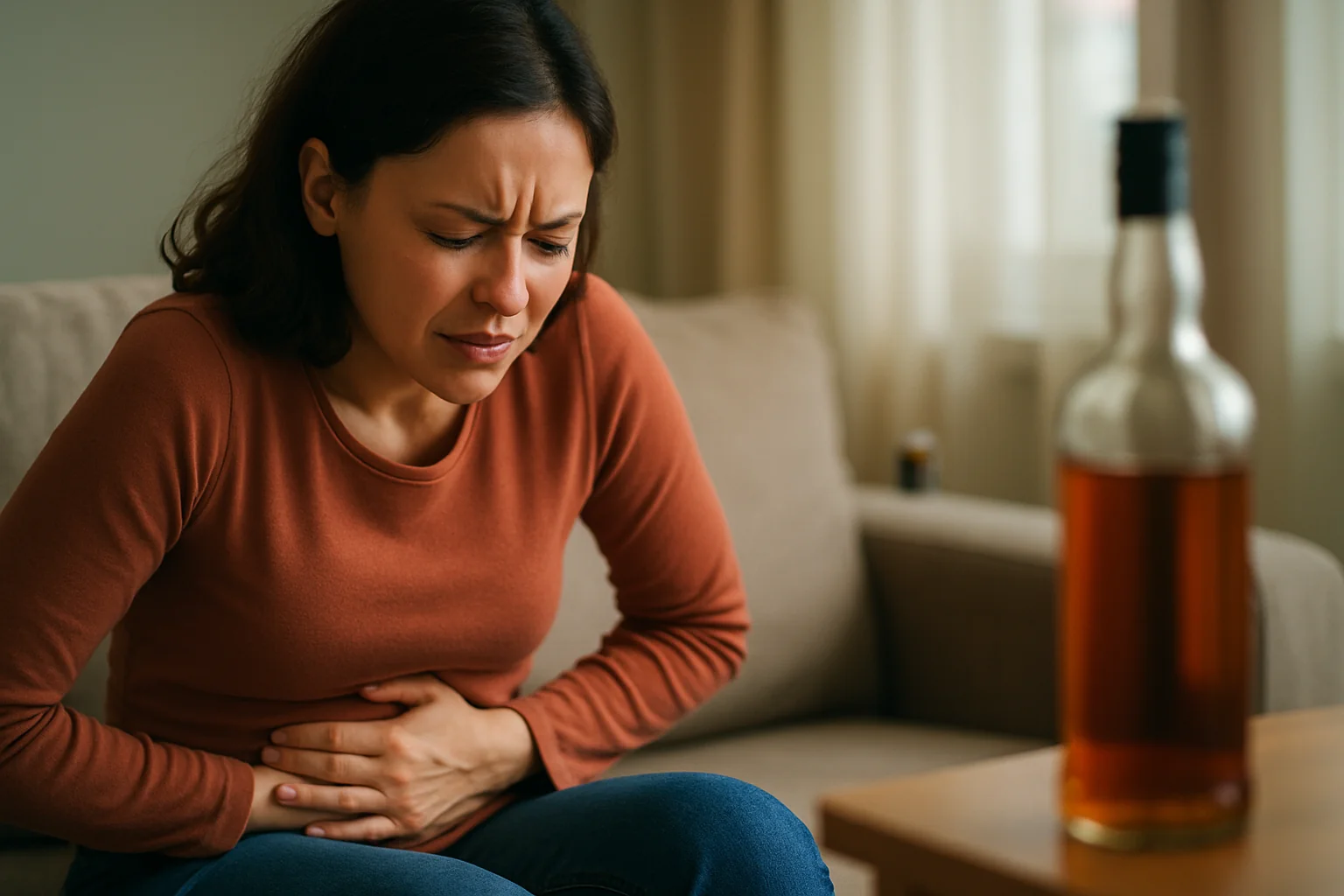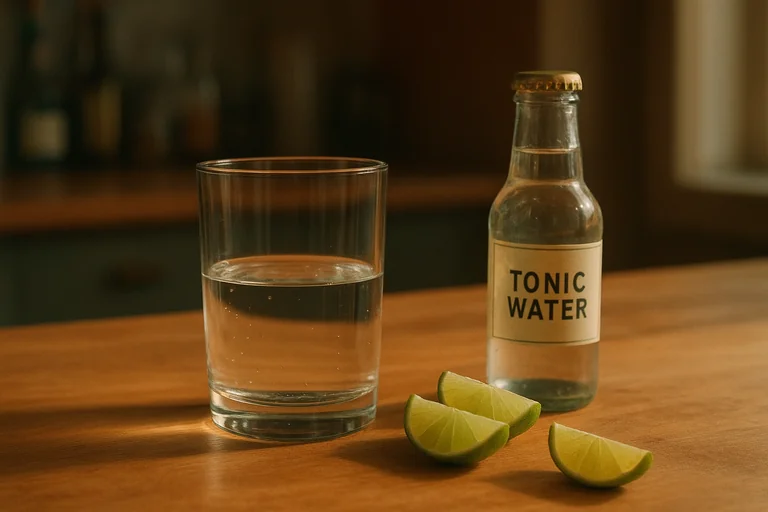A 2 minute assessment to get a personalized mental health or alcohol recovery plan.
Abdominal cramping after drinking is your gut's response to alcohol's inflammatory and irritating effects on your digestive system.
What You'll Discover:
- How alcohol causes gastritis and stomach inflammation.
- Why alcohol increases stomach acid and slows digestion.
- The impact of alcohol on your gut microbiome.
- Other alcohol-related causes of abdominal pain.
- Long-term consequences for digestive health.
- How to find relief and prevent future cramping.
That sharp, twisting pain in your stomach after a night of drinking is more than just a minor inconvenience. For many, abdominal cramping is a distressing and common side effect of alcohol consumption.
Let's explore what's happening in your body to cause this discomfort and what you can do to find relief.
How Alcohol Affects Your Gut
When you drink alcohol, it begins a journey through your digestive system that can have a significant impact on your gut health. The abdominal cramping and stomach pain you experience are the direct result of alcohol's inflammatory and irritating effects on your gastrointestinal tract.
Gastritis: The Inflamed Stomach Lining
One of the most common causes of abdominal pain after drinking is gastritis - inflammation of the stomach lining. As Medical News Today explains, alcohol can directly irritate and erode the stomach lining, leading to this painful condition. The National Institute on Alcohol Abuse and Alcoholism (NIAAA) confirms that alcohol increases inflammation throughout the body, with the stomach being a primary site.
There are two main types:
- Acute Gastritis - Occurs after a single episode of heavy drinking. Characterized by sudden onset of nausea, vomiting, and a gnawing or burning ache in the stomach.
- Chronic Gastritis - Develops from long-term, excessive alcohol consumption. Symptoms may be less severe but more persistent and can lead to serious complications over time.
Increased Stomach Acid and Delayed Digestion
Alcohol stimulates the stomach to produce more acid than usual. This excess acid can further irritate the stomach lining and contribute to the burning sensation. Additionally, as the Cleveland Clinic points out, alcohol slows down the rate of digestion. This means food and alcohol remain in the stomach for longer, increasing the risk of irritation and discomfort.
The Gut Microbiome in Disarray
Your gut is home to trillions of bacteria, both good and bad, that make up your gut microbiome. A healthy gut microbiome is essential for proper digestion, immune function, and overall health. Unfortunately, alcohol can throw this delicate ecosystem into disarray.
A 2017 research review published in PMC found that chronic alcohol consumption can lead to:
- Dysbiosis - An imbalance between the good and bad bacteria in your gut
- Bacterial Overgrowth - An increase in the total number of bacteria in the small intestine
This disruption can lead to bloating, gas, and abdominal cramping.
Increased Intestinal Permeability (Leaky Gut)
Alcohol can damage the lining of the intestines, making it more permeable or "leaky." This increased intestinal permeability allows harmful substances, such as toxins and undigested food particles, to leak from the intestines into the bloodstream. This can trigger an inflammatory response throughout the body and contribute to abdominal pain and cramping.
Other Alcohol-Related Causes of Abdominal Pain
While gastritis is a common culprit, it's not the only reason for abdominal cramping after drinking.
Pancreatitis - Pancreatitis is inflammation of the pancreas, a gland that plays a crucial role in digestion and blood sugar regulation. Heavy alcohol consumption is a leading cause of both acute and chronic pancreatitis. Symptoms can include severe, persistent pain in the upper abdomen that may radiate to the back, nausea and vomiting, fever, and rapid heart rate. This is a serious medical condition requiring immediate medical attention.
Stomach Ulcers - As WebMD explains, chronic gastritis can eventually lead to peptic ulcers - open sores on the lining of the stomach or small intestine. Symptoms include burning sensation in the stomach, feeling of fullness, bloating, intolerance to fatty foods, heartburn, and nausea.
Irritable Bowel Syndrome (IBS) - IBS is a common disorder affecting the large intestine. While alcohol doesn't cause IBS, it can be a trigger for IBS symptoms in some people, including abdominal cramping, bloating, gas, diarrhea, and constipation.
Long-Term Consequences for Digestive Health
While the immediate effects can be painful, the long-term consequences can be even more severe. Chronic, heavy alcohol consumption can lead to:
Increased Risk of Cancer - Alcohol is a known carcinogen. Chronic alcohol consumption is a major risk factor for cancers of the esophagus, stomach, and colon. The risk increases with the amount of alcohol consumed over time.
Liver Disease - The liver is the primary organ responsible for metabolizing alcohol. Chronic, heavy drinking can lead to fatty liver, alcoholic hepatitis, and cirrhosis.
Malnutrition - Alcohol can interfere with the absorption of essential nutrients like vitamins and minerals. This can lead to malnutrition, causing fatigue, weakness, and a weakened immune system.
Finding Relief and Prevention
If you're experiencing abdominal cramping after drinking, here are steps to find relief and prevent future episodes.
Immediate Relief:
- Stop Drinking - Give your stomach and intestines time to heal
- Stay Hydrated - Drink plenty of water and clear fluids, especially if you've been vomiting
- Eat Bland Foods - Stick to toast, rice, bananas, and applesauce until symptoms subside
- Over-the-Counter Medications - Antacids can help neutralize stomach acid and relieve burning
Long-Term Prevention:
- Reduce or Eliminate Alcohol - The most effective way to prevent alcohol-induced abdominal cramping
- Avoid Triggers - Pay attention to which types of alcohol trigger your symptoms
- Eat Before You Drink - Never drink on an empty stomach
- Stay Hydrated - Drink plenty of water before, during, and after drinking alcohol
- Manage Stress - Stress can exacerbate digestive problems
- Support Your Gut Microbiome - Eat a diet rich in fiber, fermented foods, and prebiotics
When to See a Doctor
Most cases of alcohol-induced abdominal cramping can be managed at home, but see a doctor if you experience:
- Severe or persistent abdominal pain
- Vomiting blood or a substance that looks like coffee grounds
- Black, tarry stools
- Unexplained weight loss
- Fever
- Rapid heart rate
These could be signs of a more serious medical condition requiring immediate medical attention.
Your Gut Is Sending You a Message
Abdominal cramping after drinking alcohol is more than just a hangover symptom. It's a clear signal from your body that alcohol is having a negative impact on your digestive health.
If you're tired of the painful effects of alcohol on your digestive system, know that you're not alone and that help is available. By making informed choices about your alcohol consumption and seeking medical advice when needed, you can break free from the cycle of abdominal cramping.
Ready to explore your options? Take the Alcohol Use Assessment to learn more about your drinking patterns.
References
[1] Medical News Today. "What is the link between alcohol and stomach pain?" https://www.medicalnewstoday.com/articles/alcohol-stomach-pain
[2] WebMD. "What Is Alcoholic Gastritis? Causes, Symptoms, Treatment" https://www.webmd.com/mental-health/addiction/alcoholic-gastritis-overview
[3] PMC. "Alcohol and Gut-Derived Inflammation" https://pmc.ncbi.nlm.nih.gov/articles/PMC5513683/
[4] Cleveland Clinic. "Hangover Symptoms, Remedies & Prevention" https://my.clevelandclinic.org/health/diseases/16627-hangover




